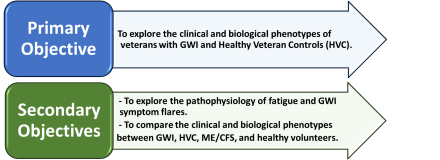What is the IN-DEPTH project?
The Investigative Deep Phenotyping (IN-DEPTH) project is the first ever collaboration between the Intramural Research Program of the National Institute of Neurological Disorders and Stroke (NINDS) at the National Institutes of Health (NIH) and the U.S. Department of Veterans Affairs (VA). Researchers from both facilities are joining together to gain more insight into the characteristics and deeper understanding of Gulf War Illness (GWI).
Who runs this study?
The study is a collaboration between the National Institutes of Health (NIH) and the U.S. Department of Veterans Affairs (VA). The NIH study is sponsored by the NIH National Institute of Neurological Disorders and Stroke. The principal investigator is Dr. Brian Walitt.
What is this study about?
This study is an observational/natural history study of 50 Veterans with GWI and 25 Healthy Veteran Controls (HVC) who were deployed to support Operation Desert Storm/Desert Shield between August 1990 and June 1991.

This protocol is a “sister study” to and modeled after the NIH protocol 16-N-0058: Myalgic Encephalomyelitis/ Chronic Fatigue Syndrome (ME/CFS) at NIH. The symptoms of GWI and ME/CFS are very similar, and much may be learned about each disorder through comparison. The ME/CFS study utilized a similar deep phenotyping approach to that which is being used in Project IN-DEPTH. Therefore, we will utilize the information previously gathered to characterize Gulf War Illness and evaluate individuals in a similar fashion.
What kind of commitment is involved?
Most participants will have an inpatient admission (typically 14 days) at the NIH Clinical Center in Bethesda, MD.
Participants may alternatively be scheduled for more than a single inpatient visit or perform part of the protocol on an outpatient basis to accommodate participant needs, availability of appointments and investigators, and technical difficulties.
Participants will also wear an activity monitor and complete diaries for two weeks, typically at home after their inpatient visit.
Why is part of the study being done at VA and part done at NIH?
This collaboration allows the two agencies to focus on their area of expertise and available resources.
The VA has been conducting research focused on the Gulf War Veterans for many years and has developed relationships with the patient population that will optimize recruitment.
The NIH has created a system to uniquely characterize illness and has built collaborations to maximize the expertise within each institute. NIH has been successful at studying other diseases in this systematic way, so we will use these same techniques with veterans with the hope of finding new information about Gulf War Illness.
How much does it cost to be in the study?
There is no cost to participate in the study.
Will I be paid to be in the study?
You will receive compensation for procedures you complete. If needed, NIH will cover travel expenses to and from the Clinical Center within the United States.
Are all procedures required?
There are required and optional procedures for this study. However, if you have had any of these procedures in the past year at the NIH, you may not have to repeat them for this study. If you had the procedure done somewhere else, you may need to have it done at the NIH. This can be discussed with the study team.
Can I have the NIH portion of the study done at VA?
No. With the type of specialized testing planned for the study, the study participant will need to be at the NIH Clinical Center to complete the necessary procedures.
Do I have to be vaccinated for COVID-19 to participate?
COVID-19 vaccination is not required to participate. You will be asked about all vaccines, including COVID-19 vaccination, as a part of the comprehensive history taken during your stay.
Will I have to have a COVID test before I come to NIH?
All participants require a phone screen for COVID symptoms prior to and upon arrival to the NIH.
As part of NIH protocol, antibodies specific to infection and vaccination will be drawn as part of the study.
The NIH requirements on COVID testing for patients and visitors changes as the number of COVID cases change around the U.S. In some cases, COVID-19 testing may be required before or during your stay.
For the most up-to-date information, please refer to the NIH Visitor Information page. Visitor Information | National Institutes of Health (NIH).
Am I eligible to participate if I had COVID-19?
Individuals who have laboratory or medical record documentation consistent with past COVID infection will not be eligible for the study at this time. Testing for COVID antibodies will be part of the screening process for the study.
Will my records be shared with the VA?
Because this is a collaborative effort, the records are shared with the research team at the VA. If you wish to share the information with your VA health care provider or an outside medical provider, you will need to sign a medical release form. The medical release form can be found here.
How can I ask questions or ask for help?
At the VA: Contact the VA IN-DEPTH Team at vhawas.indepth@va.gov.
At the NIH: E-mail us at gwiindepth@ninds.nih.gov or call us at (301) 402-0880.
Useful Links
- VA Project IN-DEPTH - War Related Illness and Injury Study Center (va.gov)
- Directions to the Clinical Center | Clinical Center Home Page (nih.gov)
- Getting to NIH | National Institutes of Health (NIH)
- NIH Visitor Map
- Patient Information | Clinical Center Home Page (nih.gov)
- Patient Services (nih.gov)
- NIH IN-DEPTH Consent
